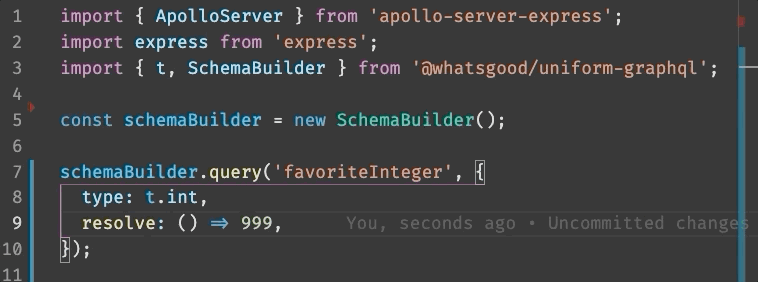Primitive Types
Learn how to create and use primitive types
Primitive types are the simplest building blocks of GraphQL. They depend on nothing else, but everything else depends on them. These are scalars and enums. You might have noticed that we are using this t.string value to communicate the resolve type of our hello query. That's just one of the many types you can use in Uniform GraphQL. Before we dive into the primitives, let's take a step back and see how types are even used in Uniform GraphQL:
Type Safety
//...
// This resolver has an error on purpose.
schemaBuilder.query('favoriteInteger', {
type: t.int,
resolve: () => {
// Returning a String even though the resolve type is Int
return '999';
},
});
// ...This resolver has an error on purpose. What do you see when you copy these lines to your index.ts?
What you've just witnessed is the simplest example of how Uniform GraphQL helps you with type safety:

Nullability
Below are a few example of valid resolver functions for a nullable string. Pay attention to the .nullable modifier on t.string.nullable. You will keep using this to turn your types into their nullable counterparts.
//...
schemaBuilder.query('stringExample', {
type: t.string.nullable, resolve: () => {
return 'string value';
},
});
schemaBuilder.query('voidExample', {
type: t.string.nullable, resolve: () => {},
});
schemaBuilder.query('nullExample', {
type: t.string.nullable, resolve: () => {
return null;
},
});
schemaBuilder.query('undefinedExample', {
type: t.string.nullable, resolve: () => {
return undefined;
},
});
//Built-in Scalars
Built-in scalars are the simplest types that you can use. You can use them out of the box in Uniform GraphQL. Copy the lines below into your index.ts and navigate to your playground to observe how your GraphQL schema changes. Don't forget to refresh your browser!
//...
schemaBuilder.query('favoriteInteger', {
type: t.int,
resolve: () => 999,
});
schemaBuilder.query('favoriteFloat', {
type: t.float,
resolve: () => 999.999,
});
schemaBuilder.query('isLearning', {
type: t.boolean,
resolve: () => true,
});
/**
* GraphQL spec allows both string and
* number values for the ID typedef.
*/
schemaBuilder.query('idExample', {
type: t.id,
resolve: () => 'string id',
});
schemaBuilder.query('anotherIdExample', {
type: t.id,
resolve: () => 15,
});
//...Enums
The second primitive type in GraphQL is enums. Use these to denote a set of predetermined string literals for your resolvers. Pay attention to the highlighted line. You will need to use the as const modifier when resolving enums. Otherwise, values get interpreted as regular strings instead of specific string literals.
//...
const Membership = t.enum({
name: 'Membership',
values: {
free: null,
paid: null,
enterprise: null,
},
});
schemaBuilder.query('myMembership', {
type: Membership,
resolve: () => {
return 'free' as const; },
});
//...Checkpoint
Once you're done adding all these new resolvers, navigate back to your GraphQL Playground and verify that your schema matches the typedefs below. Try changing the returned values from the resolvers and query your API to observe the changes.
enum Membership {
free
paid
enterprise
}
type Query {
hello: String!
favoriteInteger: Int!
favoriteFloat: Float!
isLearning: Boolean!
idExample: ID!
anotherIdExample: ID!
stringExample: String
voidExample: String
nullExample: String
undefinedExample: String
myMembership: Membership!
}